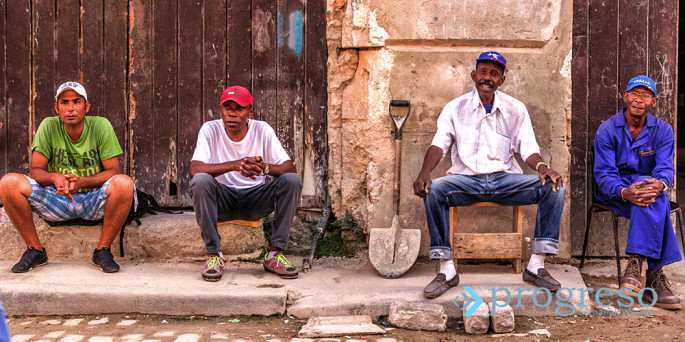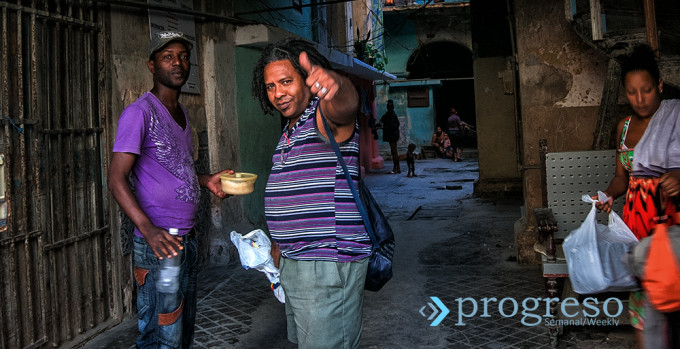
Unequal
HAVANA — “Inequality will always be with us,” said Pablo, 24. His face twisted at the terrible thought, he adds that “human beings are like that, selfish by nature.”
A group of us are in a bar, not a seedy one but one of those I like, where you can deconstruct a country so you can then rebuild it better. Anyway, we plunge into discussion, entering a topic that resembles a no-exit alley.
Inequality is everywhere, I retort, in the sense that we are different as individuals. But calling social inequality “natural” (social inequality is different from individual inequality) seems to me to be both cynical and a mechanism to exert power on others. That happens because of the movable boundaries of social classes and the convenience of including some people while excluding others.
“Those who yesterday were ‘the newly rich’ today are middle-to-high-class, because they can come out and gain privileges with their money without having to hide. It could be a business administrator, a store manager, a pop musician, a computer programmer, or the owner of this bar. But make no mistake, they were there already,” Pablo explains, always using the masculine pronoun to refer to the privileged people.
From academia (Mayra Espina, María del Carmen Zabala, Juan Valdés Paz, etc.) have come many research papers and analyses of a country where, for years, there has been talk of egalitarianism and where the word “poverty” has implied a broad discussion in the field of social sciences.
Other researchers have insisted on lesser syntagmas, such as “population at risk” or “sheltered poverty,” as described by Espina. The official political discourse has avoided a direct reference to the issue of inequality.
As Espina puts it, any mention of this issue is minimal in the guidelines that rule the socio-economic updating in Cuba.
“In general,” she writes, the authorities “omit references to the existing inequality and poverty, and fail to commit themselves to act upon them with a social policy that introduces tools of equity.”
And one of the implied dangers becomes clear to me very soon, when my friend talks about social classes with the ease of a North American born in a society that for five centuries has practiced the differentiation of classes.
That scares me. Pablo, whom I have known for eight years, catches me by painful surprise.
What are the social classes in Cuba? Do people have anything like an awareness of belonging?
I ask several of my friends, all of them university students, and many of them say that they wouldn’t know what “class” they’d fit into — partly because in Cuba we don’t speak of classes but of social groups. Although they are concepts that refer to a similar reality, they have different political connotations.
“I think that there is already enough inequality in Cuba to split into classes. Another factor is that people have social practices and representations, ideologies and defined class identities. That creates a class, just as a wallet does, so I wouldn’t know for sure what I am,” one of them explains.
In post-1959 Cuba, social inequality continued to exist, although a lot less than before. The issue was ignored for too long a time, and now the chickens are coming home to roost.
“I don’t know what to say,” says a woman engineer. “My salary — compared with that of the rest of the people who do the same job — is acceptable, maybe even above the average. But I suppose that that’s not enough. On the other hand, I am single, have no children and I do whatever I want with my money. If that’s being middle-class, I suppose that’s what I am.”
It occurs to me that this is not the “middle class” that the United States would like to reinforce. These young people have the talent but not the money. And in this case, contrary to the widespread idea of a youth without ideology, these are 20-some-year-olds worried about the future of Cuba, even if many of them are considering emigration as a personal option.
I also understand, contrary to what our elders have told us, that both concepts are not mutually exclusive.
The U.S. government’s measures are directed at the Cuban private sector. From its point of view, only the so-called “cuentapropistas” [self-employed entrepreneurs] — not our state-owned businesses — can negotiate directly with their companies. That would be the middle class the U.S. talks about. But in our country the middle class is still to be defined.
I raise the issue because the existence of social classes deals fundamentally with poverty and inequality, with badly distributed resources. I don’t think that Cuba is a radically poor country, such as Haiti or El Salvador. Nevertheless, about 20 percent of Cubans live in conditions of poverty, according to current studies, and that’s too many people.
Obviously, that statistic does not include a group of young people in a bar, paying for their drinks in convertible pesos, a lot more drinks than most people could afford, with unstable income from non-state jobs, without families to support, and without personal assets such as houses, cars or bank accounts.
I think I am part of that group. That’s why I speak of poverty and social inequality in a bar (not a seedy bar) with friends that join me in the dissection while paying for their drinks in convertible pesos, because the fact (or the chance) that I am here only implies that my life is not one of the worst in Cuba.
That is also why, if someone had asked in what “social class” I place myself, I would side with the salaried workers.
If earning an above-average wage without the need to support a family; if occasionally going to the same bar where the entrepreneur, the store manager, the musician drink; if living in the Playa district even if we don’t own a house, a car or a bank account; if all that places people in a “middle class,” not in the level of the salaried workers — what does it mean to be poor in Cuba?
To be jobless, I suppose. To be unable to use private transportation when public transportation is inefficient; not to have a solid roof overhead; not to have an indoor toilet; not to eat enough for an adequate diet; to live in shelters, I suppose. And let’s not talk about individual dreams and aspirations, which also are part of our society.
Some of these circumstances can be explained by the nation’s low GNP, but not by the racial or gender discrimination or any other condition that makes people socially unequal.
It is relevant that social policy in Cuba be the object of reform, as has been said. That’s essential. Not everybody needs the same. In fact, there are some people who need more than others, more than me and my friends, who have the wherewithal to go into a bar ruled by supply and demand. We probably don’t need a total subsidy.
In principle, an equitable distribution could make the difference between really advancing toward socialism, as posited, and not toward a brutal market society.
When, some years ago, the doors were opened to individual enterprises, the starting points were different. Those who had the know-how, qualifications, capital or goods to generate mercantile activities, information, connections and/or “opportune” relations moved ahead.
As Espina has explained frequently, those are the new assets required to move up the social structure. And they only spread the inequality that already existed.
I don’t believe, as Pablo does, that social inequality is inherent to human society. I understand that that optimism is a luxury. But I refuse to assume that it is “natural,” because the social order is also the product of our actions.
Clearly, there is social inequality in Cuba. The point is — will it increase?
Progreso Weekly authorizes the total or partial reproduction of the articles by our journalists so long as source and author are identified.
[Photos by Carlos Ernesto Escalona Martí (Kako)]



